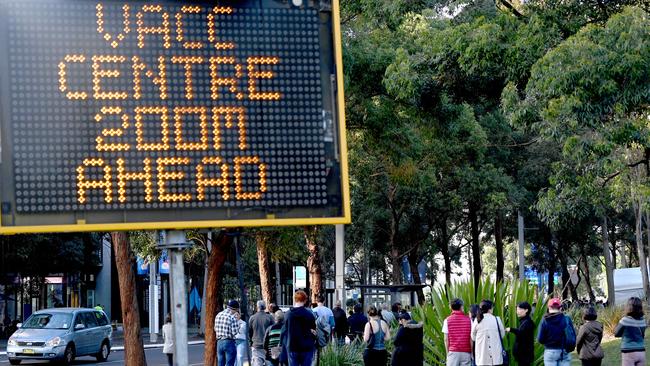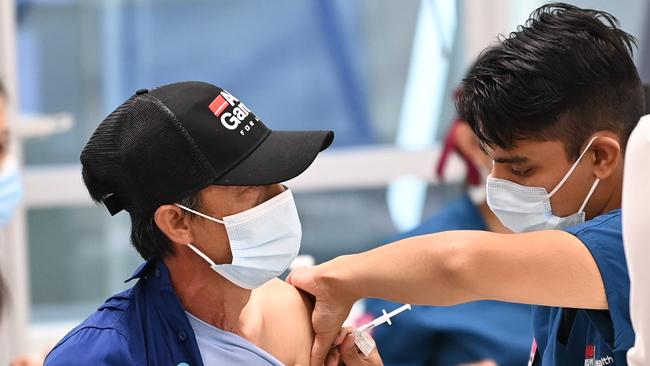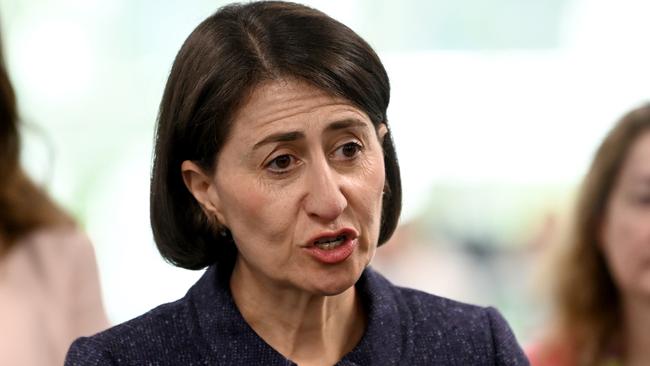Officials stress that AstraZeneca vaccine blood clot risks are minimal
Australia has identified better treatments that can respond “effectively and quickly” to any cases of very rare bloodclots caused by the AstraZeneca vaccine.
NSW
Don't miss out on the headlines from NSW. Followed categories will be added to My News.
Australia has identified better treatments that can respond “effectively and quickly” to any cases of very rare bloodclots caused by the AstraZeneca vaccine.
Chief Medical Office Professor Paul Kelly said Australia had been able to watch what happened in the rest of the world and learn from their experiences with the rare clots, known as Thrombosis with Thrombocytopenia Syndrome (TTS).
“The key issue there is to not use the type of medicine we usually use for clots which is called heparin, because that can make things worse,” he said.
“Some of the early unfortunate events and higher death rates in Europe in particular were because people had received that medicine, which actually inadvertently made the situation worse.”

Prof Kelly has written to GPs involved in the vaccine rollout advising them to pass on the new information to their patients.
“It is important to highlight that due to better awareness, early diagnosis and appropriate treatment, the outcome and prognosis of the majority of those who have experienced this (blood clot) syndrome is good,” he said.
Doctors are also on alert to look out for severe headaches around five days after vaccination.
As of 20 May, there have been 21 confirmed and four probable cases of TTS in Australia and one person who has died.
Globally one in a million people who received the AstraZeneca vaccine have died from TTS on average.
Vaccine hesitancy blame game
Blaming Australia’s vaccine hesitancy rates on the media has backfired on a top health official trying to defend the sluggish rollout, as Melbourne reports four new cases of Covid-19.
Victorian contact tracers were on Monday desperately trying to track down the source of the new virus cases among a “close” family in Melbourne’s northern suburbs with no known links to exposure sites from previous outbreaks.
The new cases have highlighted the importance of getting as many vulnerable vaccinated before winter sets in, with Australia surpassing only 3.6m doses as of Sunday.

Responding to concerns about higher rates of vaccine hesitancy fuelling the slow rollout, Health Department secretary Professor Brendan Murphy suggested the problem lay with the media, as reporting on the AstraZeneca blood clot issue was not balanced.
“I think the biggest impact on hesitancy is, frankly, sensationalist media reporting,” he said.
But this view was not supported by chief medical officer Professor Paul Kelly, who encouraged hesitant Australians to seek out “official sites” and trusted medical professionals.
“Rather than blame one group or another, I think we all have our part to play in this,” he said.
“Media has an important role in bringing truthful detailed information to the public.”
Infectious disease expert Professor Peter Collignon said the large degree of vaccine hesitancy was “not unexpected,” but could be addressed with better messaging.
“To some degree I do think we need messaging out there that’s more positive, really emphasising the benefits versus the risks of the vaccine,” he said.
“Im not sure if that’s best coming from scientists like myself though, that’s more for marketing and advertising people I would think.”
At Sydney’s Olympic Park mass vaccination hub, lines of people keen to get their jab stretched across the block on Monday morning — but just 1100 people have registered to get the AstraZeneca vaccine at the facility this week.

Over 50s can now get their AstraZeneca vaccine at 26 vaccination sites across the state, including 17 in regional and rural NSW.
Premier Gladys Berejiklian said the rollout of the AstraZeneca jab through the hubs will help fast-track the rollout.
“We are keen to see those numbers continue to escalate,” she said.
“We can’t even think about opening borders … until the vast majority of our population is vaccinated.”
Ms Berejiklian said NSW had enough doses to meet demand until the end of September.
NSW Australian Medical Association President Dr Danielle McMullen said some GPs were still struggling to get access to the doses they need.
“There are still some in general practice who feel they don’t have enough vaccines and others who are able to order more than they think they are able to deliver,” she said.
Ms Berejiklian said she intended to raise the issue of vaccine shortages across the GP network at the national cabinet.
Originally published as Officials stress that AstraZeneca vaccine blood clot risks are minimal




